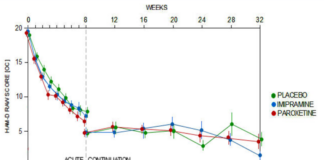Tag: antidepressants
1 in 6 Adults in the US Takes a Psychiatric Drug
Overall, 16.7% of 242 million US adults reported filling 1 or more prescriptions for psychiatric drugs in 2013.
Is Society or Psychiatry to Blame for the “Seriously Mentally Ill”...
Adults in the U.S. diagnosed with “serious mental illness” die on average 25 years earlier than others. This is not controversial, as establishment psychiatry and its critics agree. What is controversial is who is to blame?
Antidepressants Increase the Risk of Suicide and Violence at All Ages
Although the drug industry, our drug regulators and leading psychiatrists have done what they could to obscure these facts, it can no longer be doubted that antidepressants are dangerous and can cause suicide and homicide at any age.
“A River of Lost Souls Runs Through Western Colorado”
The Washington Post investigates the epidemic of suicide and the overuse of psychiatric drugs that is sweeping through towns in Colorado.
“FDA Issues Guidelines for Female Libido Pills After Learning Some Hard...
From STAT: It “looks like the FDA is using this guidance to keep another company from trying to get a female sexual desire drug approved...
What’s the Harm in Taking an Antidepressant?
We know that all drugs have side effects. That’s just part of the deal right? But is it really possible that an antidepressant can cause a sane person to act like a cold-blooded criminal?
Antidepressant Use Linked to Dementia
A new study finds that elderly individuals using antidepressants are at significantly higher risk for dementia compared to depressed individuals who did not take the drugs.
Patients with OCD Prefer Psychotherapy
A new study in Psychiatric Services examines patient preferences for the myriad treatments available for Obsessive-compulsive disorder (OCD)
$11.9 Million Paxil Suicide Verdict: The Inside Story
The judicial system and the public are becoming increasingly aware of the hazards of psychiatric drugs, including their capacity to make people behave in ways that are harmful to themselves and others, and contrary to their past behavior and character.
Study 329 Taper Phase
Most doctors still affect surprise at the idea SSRIs might come with withdrawal problems. Regulators knew very clearly since 2002 about the problems, but have decided to leave any communication of these issues in company hands.
Use of Antidepressants Linked to Diabetes
Selective serotonin reuptake inhibitors (such as Prozac and Zoloft) are the most commonly prescribed medication for depression. SSRIs have long been associated with an...
Clinical Trials Underreport Harms of Antidepressant Medications
A group of researchers recently found serious bias in the reporting of harm due to adverse events in antidepressant medication clinical trials. They report...
Study 329 Continuation Phase
All the fuss about Study 329 centers on its 8-week acute phase. But this study had a 24-week Continuation Phase that has never been published. Until Now.
How Do Antidepressants Really ‘Work’?
A recent review, published in Neuroscience & Biobehavioral Reviews, challenges the dominant assumptions about the neurochemical and therapeutic effects of Selective Serotonin Reuptake Inhibitors...
“Antidepressants Make it Harder to Empathize, Harder to Climax, and Harder...
Psychiatrist Julie Holland explains how antidepressants can medicate away important feelings and experiences in a video for Big Think.
Video →
Researching the Link Between SSRIs and Violence
In 2010, my 25-year old son was prescribed Prozac for depression. After a psychiatrist doubled his dose, my son became acutely psychotic and had to be admitted to the hospital. Over the next twelve months, during which time he was treated with antidepressants and neuroleptics, my son had five further psychotic experiences. I thought it might be that my son was having difficulty metabolising the drugs.
Interview: Researcher Runs Trial on Antidepressant Withdrawal
Tony Kendrick, a professor of Primary Care at the University of Southampton, has found through his research and practice that too many people are being prescribed antidepressants long-term without the information and support necessary to get off of them.
Rising Rates of Suicide: Are Pills the Problem?
If you’ve read recent reports that state “US suicide rates surge to a 30 year high,” you might first justify the reality with the fact that things feel very wrong in our world today. On a personal, national, and planetary level, people are suffering to survive and the distress is coming from all sides – medical to economic to existential. But you probably also wonder why more people are choosing this permanent and self-destructive path, and feel compelled to submit to seemingly logical appeals to provide these individuals more help and greater access to treatment. Surprise: that may be the last thing our population of hopeless and helpless needs. Life’s inevitable challenges are not the problem. It’s the drugs we use that are fueling suicide.
“If Antidepressants Don’t Work Well, Why Are They So Popular?”
“The true balance of risk versus benefit for people taking these kinds of antidepressants will probably only emerge when independent researchers have access to...
Major Review Finds Antidepressants Ineffective, Potentially Harmful for Children and Teens
In a large review study published this week in The Lancet, researchers assessed the effectiveness and potential harms of fourteen different antidepressants for their use in children and adolescents. The negative results, familiar to MIA readers, are now making major headlines.
Prescribing Antidepressants for Girls: Intergenerational Adverse Consequences
Children exposed to SSRIs during pregnancy, a recent study shows, were diagnosed with depression by age 14 at more than four times the rate of children whose mothers were diagnosed with a psychiatric disorder but did not take the medication. Such reports are usually met, appropriately, with an outpouring of reassurances from clinicians who take care of pregnant women, who need to protect their emotional wellbeing in whatever way they can. From my perspective as a pediatrician specializing in early childhood mental health our attention must be on prevention.
Who Will Guard the Guardians of Psychiatry?
The assertion that the so-called antidepressants are being over-prescribed implies that there is a correct and appropriate level of prescribing and that depression is a chronic illness (just like diabetes). It has been an integral part of psychiatry's message that although depression might have been triggered by an external event, it is essentially an illness residing within the person's neurochemistry. The issue is not whether people should or shouldn't take pills. The issue is psychiatry pushing these dangerous serotonin-disruptive chemicals on people, under the pretense that they have an illness.
“We Need to Better Detect Depression but that Shouldn’t mean more...
The Conversation explores the proposition that "while it is important that the detection of depression is improved and that suffering is alleviated, simply writing...
In Honor of Fear and Pain
Our use of antidepressants has turned single-episode struggles that recovered 85% of the time within one year, never to recur, into chronic and debilitating disorders that hold patients hostage in their own arrested development. But, If you are in the hole of pain, here’s what I have to say to you. It’s what I say to my patients, and what I tell myself in times of struggle.
“Beware of Prescription Medications Linked to Memory Loss”
“Pharmacology experts and medical researchers report that many commonly used prescription medications, including anxiolytics, painkillers, antidepressants and cholesterol-lowering drugs, may cause cognitive impairment and...
























